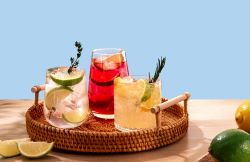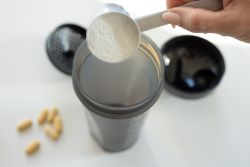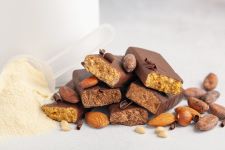
J. David Legan, PhD
Director of Science
David earned his Ph.D. in Food Technology from the University of Reading in the UK by modeling the ecology of mixed microbial populations, and then moved to Campden BRI in a variety of microbiological food safety research and client service roles. During that time, he was project lead for the Bacillus component of the UK’s pathogen modeling program. He moved again to Nabisco Research in New Jersey where he ran the corporate microbiology lab and developed a program of preservation technology development and microbial modeling. After the Kraft Foods acquisition, he moved to Chicago to work on Food Safety and Preservation research, and through modeling and validation studies:
- Optimized Oscar Mayer’s use of lactate and diacetate and their naturally cultured alternatives as Listeria-control agents in Ready to Eat meats
- Specified process conditions central to Oscar Mayer’s commercial launch of High Pressure Pasteurization of naturally cured RTE meats
David had responsibility for the Kraft cultures R&D group, developed a partnership to explore microwave sterilization leading to several patents, and led a program that developed an internal proprietary natural antimicrobial commercialized in several Kraft products. Technologies from his group supported approximately $4 billion in annual sales.
After years as a microbiology "client", he is now back in the "provider" role as Director of Science at Eurofins Microbiology Laboratories, Inc., by way of the Covance Food Solutions group based in Madison, WI, which he joined in 2016. In this role, he ensures appropriate method validation, explores new testing technologies, and fields multiple complicated food microbiology questions.
Products that his team has evaluated or developed and launched include:
- The 3M MDS platform in the Madison microbiology laboratory
- Flow cytometry for enumeration of probiotics
- Strain-level confirmation of probiotic identification using the polymerase chain reaction (PCR)
- Next-generation sequencing using the Oxford Nanopore Technologies GridION sequencing platform for microbial identification and microbiome analysis
Below are resources from David:
The rapid rise of mocktails and alcohol alternatives signals a deeper shift in consumer behavior. As the category matures, brands are discovering that removing alcohol is only the beginning.
As the category of sports nutrition matures, so does the science behind it, and few ingredients illustrate that shift better than creatine. Once viewed as a niche performance supplement, creatine has entered the mainstream, driven by a growing body of research, broader consumer education, and innovation in product formats.
Creating shelf-stable nutritional bars and other natural food products is about understanding the science behind food preservation, taste and appearance. One of the most critical factors in the formulation of long-lasting, safe and appealing products is water activity. Water activity plays a major role in maintaining texture, reducing the rate of fats oxidation preventing spoilage and ensuring safety from microbial growth. Keep reading to learn what is being done to create a longer shelf life.
An entrepreneurial brand wanted to develop a shelf-stable liquid formula that could deliver proven joint-supporting ingredients in a convenient, consumer-friendly format. They turned to The National Food Lab for help to bring their concept from ideation to execution with scientific rigor and market-readiness. Keep reading to find out how we handle these situations.
Explore the fast-evolving world of functional beverages with insights on formulation trends, innovation challenges, and scale-up strategies from Eurofins Product Development & Innovation.
Explore how The National Food Lab, Eurofins’ Product Development Center of Excellence, helped a start-up successfully launch a new Greek yogurt product line—blending innovation with tradition to meet evolving consumer demands.
Discover how The National Food Lab, Eurofins Product Development Center of Excellence, helped an entrepreneur turn an idea into a successful wellness brand, developing and commercializing functional herbal teas in just 10 months.
Discover how we helped a client reformulate their restaurant-crafted simmer sauces for retail success—reducing sodium from 2,000 mg to 200 mg per serving while preserving the bold, authentic flavors that made them a customer favorite.
Discover how to reduce sodium without sacrificing taste or functionality in food and beverage products. This white paper explores formulation strategies, technical insights, and best practices for achieving sodium reduction while maintaining consumer appeal.
Sugar reduction is a growing priority in product development as consumers seek to address concerns related to sugar consumption. Removing sugar from a formulation presents several challenges beyond just replacing its sweetness. This article walks through considerations that must be made for a successful sugar reduction strategy.











